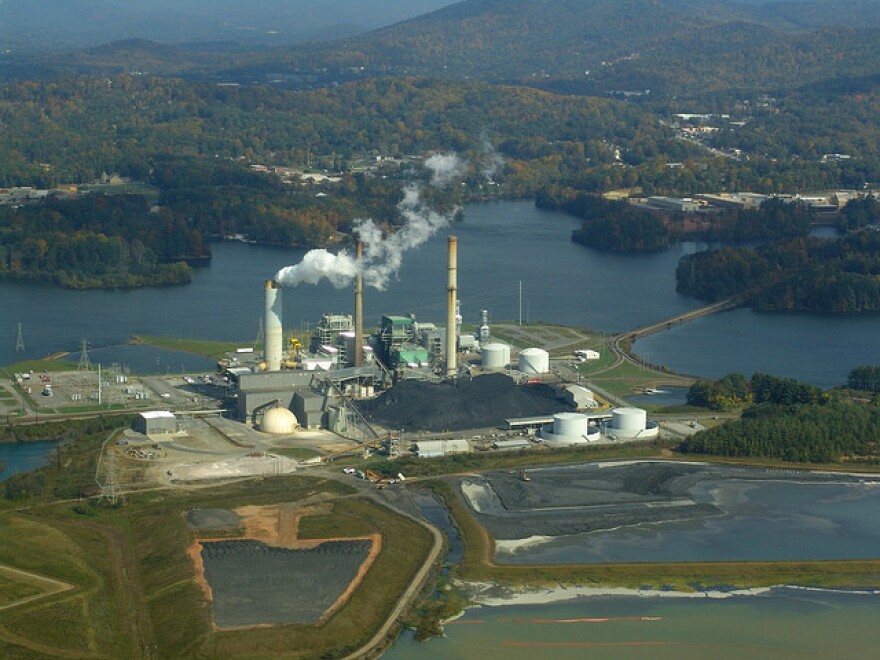A few members of the North Carolina House of Representatives will be back in Raleigh for a skeleton session today, but no real business is expected to be conducted. Technically, they need to be there to keep the legislature in session. That’s because they couldn’t agree with their colleagues in the Senate on one of their main priorities this summer – what to do about 33 coal ash dumps around the state.
This story starts in February this year, and you might have seen it on national newscasts.
On the PBS Newshour: “A major spill of toxic coal ash is raising questions again about the safety of water.”
On the Rachel Maddow Show: “A Duke Energy coal ash dump in Eden, N.C., broke loose, went gushing into the Dan River, coating that river bottom for 70 miles with a ribbon of sludge.”
And on the PBS Newshour again: “The ash, which contains arsenic and other dangerous metals, is produced from burning coal.”
Pretty much immediately, conservation groups issued statements saying the state had ignored problems with the 33 ponds, where Duke Energy stores 100-million tons of coal ash. Federal prosecutors started an investigation.
And the state Senator representing the town of Eden held a press conference saying the ponds should now be a top priority. That senator happened to be the chamber’s highest ranking member, President Pro-Tem Phil Berger.
“We want to know from a standpoint of going forward, within a specific time frame what Duke is going to do or how Duke is going to handle the stored coal ash,” Berger said in a news conference.
Governor Pat McCrory made his own recommendations.
When the General Assembly went into session in May, the coal ash bill was one of the first introduced in the Senate. Senators debated it, voted on it and sent it to the House. Representatives came up with their own version, debated it and voted on it.
Then weeks passed and finally, Berger had this to report: “We’re not coming out of this session with a strong coal ash bill.”
It was 1 a.m. at the end of what should have been the Senate’s last day in session. Berger walked into the General Assembly’s press room and explained to reporters what happened with the coal ash bill.
He said, “What we had was three rogue members from the House pushing a provision that had not been vetted.”
Later that day, the response came from the person leading the House side of negotiations, Representative Chuck McGrady from Hendersonville: “I’m happy to be rogue if that means I’m protecting the House’s position on a very important bill.”
In the simplest terms of the coal ash plan, both chambers wanted to require Duke Energy to address potential contamination within 15 years. This involved setting up a commission to determine which ponds are the most urgent and need the most dramatic action. The ash would be hauled away from some places and left and covered with dirt in others.
Behind closed doors, Senate and House negotiators were at a logjam. The House wanted the commission to be housed under the Department of Environment and Natural Resources. But the Senate wanted it under the Department of Emergency Management. Berger said there’s a perception that DENR has done poor oversight of the ponds.
"Rightly or wrongly, there’s a concern amongst the public as to whether or not DENR has acted in a way that maybe they should have," Berger said.
Perhaps a more substantial disagreement was over how to handle some ponds where the ash sits below the water table.
Berger said House negotiators made a proposal about it at the last minute... and his staff didn’t have enough time to review it.
McGrady said he wanted to make sure ash couldn’t contaminate underground water systems. He said an earlier plan didn’t do that.
“The reason why that’s important is you could cap in place those sites, not put them in a landfill,” McGrady said.
Coal ash reservoirs are a problem that dates back more than 80 years. As they tried to resolve it this summer, Senate and House negotiators were figuring out North Carolina’s annual $21 billion budget -- and they ran out of time.
As lawmakers were heading out of town Friday, Governor Pat McCrory said this:
"Today, I will issue an executive order, to ensure that we do not lose any time attacking the problem," McCrory said. "DENR will begin ground water assessments of coal ash ponds at all 14 of Duke Energy’s facilities, and these assessments are the first step forward toward closure of all 14 of Duke Energy’s facilities, and these assessments are the first step forward toward closure of the ash ponds."
But the governor has had his own credibility issues, in part because he worked at Duke for more than 20 years. And environmental groups say his action came late and that Duke Energy should have been required to start removing coal ash from the ponds months ago.
Just when lawmakers will finish their work on a coal ash plan is another disagreement. They have temporarily adjourned. House Speaker Tom Tillis says he wants the bill resolved later this month. Senate leader Berger wants to do it after the November elections, when they’ll take up another contentious bill – an overhaul of the state’s Medicaid system.








